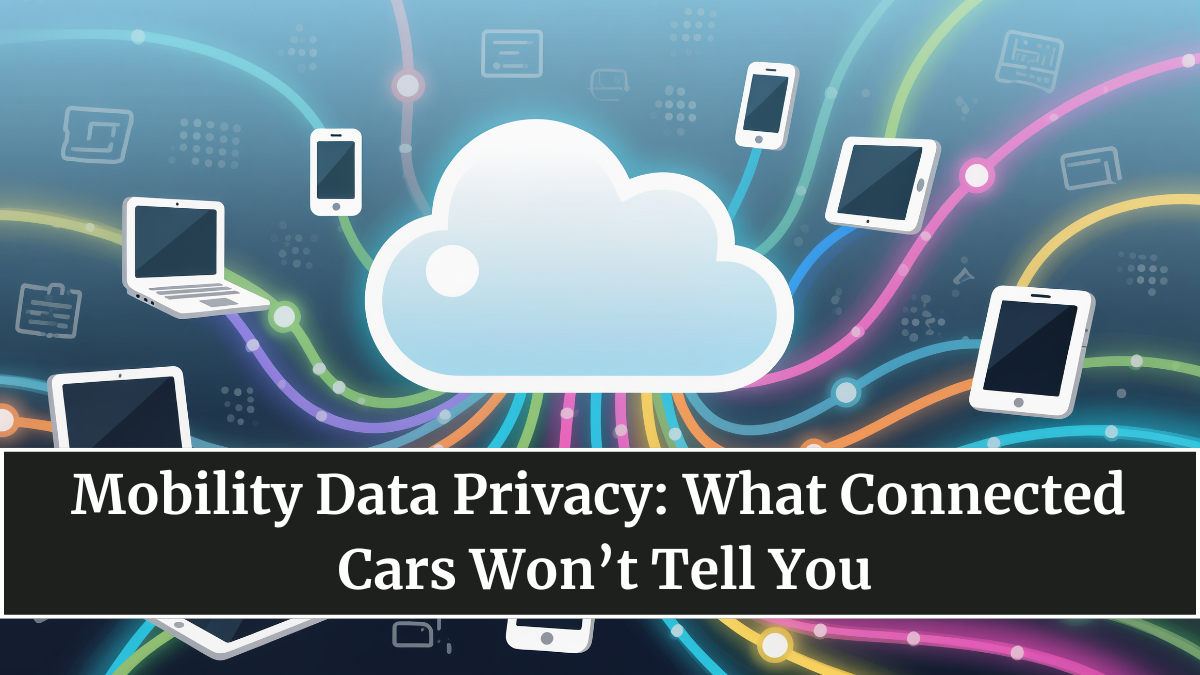Modern cars don’t just take you from one place to another — they know where you go, how you drive, and even what you say. With every trip, vehicles collect and share enormous amounts of personal data. As the era of smart and connected cars accelerates, concerns around mobility data privacy in connected cars are growing louder.
In 2025, connected vehicles are as much data centers as they are machines. While this connectivity improves navigation, safety, and entertainment, it also creates a new risk — who owns, accesses, and profits from your data.

The Hidden World of Vehicle Data
Every connected car is equipped with dozens of sensors, GPS modules, and cameras constantly collecting data. These systems track:
-
Location history and travel patterns
-
Driving speed, acceleration, and braking habits
-
Voice commands and infotainment usage
-
Contact lists, synced devices, and app data
-
Camera and radar recordings for ADAS functions
In many cases, this information is transmitted to manufacturers, insurers, and even third-party service providers. While the goal is often to improve safety or convenience, it raises serious privacy questions — especially when drivers aren’t fully aware of what’s being collected.
Why Mobility Data Is So Valuable
The data generated by vehicles has become a billion-dollar industry. Automakers and tech companies use it to enhance software, improve vehicle design, and sell targeted services. Insurers use driving behavior data to set premiums, while cities use traffic analytics to manage congestion.
But as mobility data becomes an asset, drivers lose control over their digital footprint. Once collected, this data can be anonymized — but even anonymized data can sometimes be traced back to individuals based on location and behavior patterns.
Key Privacy Risks for Drivers
The convenience of a connected car comes with hidden trade-offs. Some of the biggest privacy risks include:
-
Unauthorized tracking: Continuous GPS data can reveal personal routines and locations.
-
Data sharing without consent: Some automakers share information with advertisers and partners.
-
Cyberattacks: Hacked infotainment or telematics systems can expose sensitive data.
-
Voice and biometric leaks: Cars with built-in assistants or facial recognition may store recordings.
-
Lack of transparency: Many drivers are unaware of how much data their vehicles actually collect.
As cars become smarter, the line between data utility and intrusion continues to blur.
How Automakers Are Responding
To balance innovation and privacy, automakers are implementing new data protection frameworks. Modern vehicles now include:
-
Data consent dashboards allowing users to control what’s shared.
-
End-to-end encryption for data transmission between vehicle and cloud.
-
Anonymous data pooling for system learning without exposing identities.
-
Regional compliance with privacy laws like GDPR (Europe) and CCPA (USA).
-
Regular software updates to close security loopholes.
Some manufacturers are also introducing “privacy modes”, disabling cameras or microphones when desired, giving users greater control.
What Drivers Can Do to Protect Their Data
You don’t need to give up technology to stay private. Small steps can drastically reduce exposure:
-
Review your car’s privacy settings and disable unnecessary data sharing.
-
Avoid connecting unnecessary apps, devices, or accounts.
-
Regularly delete navigation history and call logs from infotainment systems.
-
Use strong passwords for any linked vehicle apps.
-
Keep your car’s software updated to guard against vulnerabilities.
Being mindful of how your car interacts with the cloud is now as important as locking your doors.
The Future of Data Privacy in Connected Mobility
The next generation of connected vehicles will feature data sovereignty by design — where ownership rests firmly with the user. Blockchain-based data management and edge computing will allow drivers to decide who can access what information, and for how long.
By 2030, privacy will be a key differentiator among automakers. Brands that offer transparency, opt-in control, and strong data protection will win driver trust. Legislation will also evolve to require clear consent for all mobility data usage, similar to internet privacy standards today.
The age of connected mobility promises incredible convenience — but also requires vigilance. In a world where cars know as much as your smartphone, digital trust is the new safety feature.
FAQs
What kind of data do connected cars collect?
Connected cars gather data like location, driving behavior, audio commands, and synced device information for performance and analytics.
Who owns the data generated by my car?
Ownership varies — some manufacturers claim it, while others allow users to opt in or manage sharing permissions.
Can hackers access car data?
Yes. Without proper encryption, hackers can exploit weak infotainment or telematics systems to steal or manipulate information.
How can I protect my data in a connected vehicle?
Disable unnecessary sharing, clear stored data frequently, and ensure your car’s software and apps are regularly updated.
What’s next for automotive data privacy?
Expect stronger privacy regulations, opt-in control dashboards, and transparent consent systems that let drivers control how their mobility data is used.
Click here to know more.
